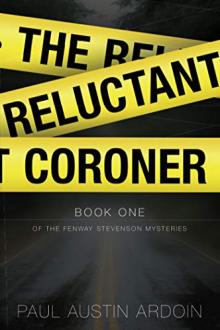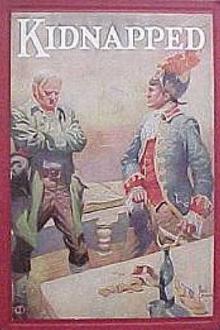The Reluctant Coroner, Paul Austin Ardoin [comprehension books TXT] 📗

- Author: Paul Austin Ardoin
- Performer: -
Book online «The Reluctant Coroner, Paul Austin Ardoin [comprehension books TXT] 📗». Author Paul Austin Ardoin
V. Saturday
Chapter Twenty-Seven
Want More Fenway?
Preview of Book Two The Incumbent Coroner
Chapter One
Chapter Two
She passed the sign that said Estancia 10 Miles and arched her back, stretching, then jumped in her seat when the rental truck drifted onto the line separating Ocean Highway from the shoulder. She set her jaw and turned the wheel a few degrees counterclockwise. A BMW in the fast lane passed her as if she were going backward.
The truck’s steering pulled to the right, and it seemed like it had only worsened during the irritating ride from Seattle. She tightened her grip on the wheel as the highway began its steady incline up to the crest of the hill, where a massive industrial complex rose to meet her field of vision. Ablaze with warm orange lights, the maze of pipes and small towers extended into the sky, steam rising around it.
She blinked and she was four years old again, in her father’s Range Rover, seeing the complex lit up in the darkness for the first time.
“Gotham City!” she had screamed from the back seat, pointing delightedly.
“No, Fenway,” Nathaniel Ferris had said, never taking his eyes off the road. “That’s Daddy’s refinery.”
“You’re Batman,” she said definitively.
“I’m not Batman,” he said, laughing. “But maybe I’m Bruce Wayne. And Mrs. Wayne expects us home soon. It’s already past your bedtime.”
Fenway shook her head and came back to the present. The Ferris Energy refinery, constantly spewing gray-brown fumes, was an ugly monstrosity in the daylight. But at night, the orange lights and the steam and the shadows from the pipes and antennae and towers created a scene almost as beautiful as the quaint seaside town eight miles down the coast.
Life had changed so much in the last six weeks. It started with the closed sign that faced her when she went to work at the clinic. No explanation—she had to go home and read a tersely worded email to learn the clinic had lost its funding.
And that same day, her mother took a turn for the worse. She would be gone in two days.
Fenway accepted the first offer on her mother’s house and moved most of her things into storage. Then, three weeks before her trip in the rental truck, tiring of applying for jobs and for apartments at the same time, she was sitting at her PC reading a rejection email when her phone rang.
It showed an unfamiliar number with an 805 area code, and she wondered if it was one of the nursing recruiters she’d sent her resume to.
“Fenway?”
She drew in her breath sharply. “Dad?”
“How are you feeling?” His voice was heavy with concern. “Is everything okay?”
“I didn’t recognize the number.”
“Still at work. I’m calling from a conference room.”
“You weren’t at the funeral.” It came out before Fenway could stop it, but after all the missed graduations and state volleyball championships and birthdays, she still felt raw.
“I—I wasn’t sure you’d want me there.”
“Really? Charlotte didn’t want to renew your vows on another of my special days?”
Silence on the other end of the line. “Look—I know you’re in a tough spot with the house and with your master's program, and I want to help.”
Fenway scoffed. “Now you want to help?”
“Yes. You’re still working in the ER?”
“I moved to the free clinic last year, Dad.”
He clicked his tongue. “Oh. I didn’t know that.”
“Yeah, well, don’t keep it in your brain too long. We lost our funding. They closed a couple of weeks ago.”
“I see.” Another pause.
“I’m applying for jobs. Just sent a couple of résumés out. Escrow closes on Mom’s house next week. I’ll be fine.”
“Fine? Where are you going to live?”
“I have feelers out. You don’t have to worry about me.”
“No—of course not. But…”
Fenway closed her eyes. He’d been so angry at her mother.
“I wonder,” Nathaniel Ferris began, “if you’d consider moving down here.”
“Down there? Estancia?”
“It’s a beautiful part of the country. I’ve got a few vacancies in my apartment buildings. I could reduce the rent.”
Fenway leaned back in her chair. “I don’t want your charity. And besides, I’m not a licensed nurse practitioner in California. I need work.”
“So pay me rent and take the next available boards.”
“And what do I do for money in the meantime?”
“I know people here. A good friend runs a pharmaceutical business. Hell, the new wing of the hospital has my name on it. You could work as a pharma rep or in hospital administration and then get a nursing position when you pass your boards.”
“That sounds like charity, too.”
“I’ll just make a few introductions. Don’t think I didn’t notice you were valedictorian of your BSN class. They’ll be thanking me. You’ll be hired before you can unpack.”
The no thanks was on the tip of her tongue, but she couldn’t say it. How many résumés had she sent out? How many apartments had she seen that were out of her price range? How was she going to get through the next few months without her mother? She pinched the bridge of her nose and swallowed hard. “What’s the catch?”
A large exhale from the other end of the line. “Come on, Fenway, I’m not all bad. There’s no catch. You’re my daughter, and I thought you could use a break.”
Fenway leaned forward again, reading the first sentence of the job rejection letter a few times until her eyes lost focus. “I’ll think about it.”
“That’s all I ask.”
Fighting with the pull of the steering wheel, she saw the lights of Estancia emerge before her. Bits and pieces started coming together in her memory: the beach down the road from her father’s mansion, the Spanish-style architecture of the outdoor mall.
Halfway down the hill, Fenway looked down at her gas gauge. The needle hung slightly above the red line. She’d probably make it.
She yawned and turned up the radio. It was Prince, and Fenway bounced in her seat, trying to get her blood flowing again. She pressed the accelerator, and the speedometer crept up to seventy.
“It’s good to see you again, Dad,” she muttered. No. That sounded weird. “I’m happy you were finally there for me.” No. Sarcasm wasn’t the way to go, and it wasn’t nearly as cathartic to say as she thought it would be. “I appreciate you getting me an apartment so quickly. I hope…”
That was a good question. What did she hope for? Did she hope to finally connect with Nathaniel Ferris after twenty years? Did she hope to sit on the white leather sofa in his mansion and leaf through her photo albums, pointing and laughing, him getting misty-eyed at all the memories he missed?
The low fuel light came on. She cursed quietly.





Comments (0)